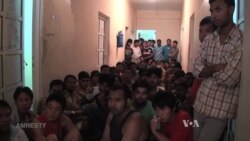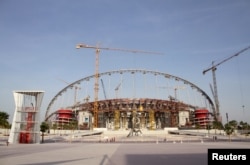Amnesty International is accusing Qatar of using forced labor and allowing other worker uses to build venues for the 2022 World Cup, in what the rights group called a "stain on world football."
In a report released Thursday the London-based organization said it interviewed 132 construction workers at the Khalifa International Stadium, one of several being built to host the games. The workers, all migrants, all reported abuse, which Amnesty described as "systematic."
Some workers lived in cramped and dirty living quarters and were not paid for months at a time. When they were compensated, it was often much less than originally promised. Many of the migrants were unable to leave the country because their passports were confiscated or they were not issued exit permits. In many cases, the workers were threatened if they complained about the abuse.
Rights groups have long accused Qatar of labor violations, but this is the first report to tie abuses to construction on World Cup venues.
'Stain on world football'
"The abuse of migrant workers is a stain on the conscience of world football," Amnesty Secretary General Salil Shetty said. "For players and fans, a World Cup stadium is a place of dreams. For some workers who spoke to us, it can feel like a living nightmare."
Qatar says it is working to resolve issues with labor conditions in the country, and noted that the report concerns only four of some 40 companies working on the projects.
"The tone of Amnesty International's latest assertions paint a misleading picture and do nothing to contribute to our efforts," the government said in a statement.
The statement acknowledged that worker abuse has occurred, but said Qatar is trying to use the World Cup as a "catalyst for change,"
Qatar last year announced reforms to its notorious kafala labor system, under which workers must get their employer's permission before being allowed to leave the country.
But Amnesty said the changes, which take effect late this year, "will do little to alter the power dynamics between migrant workers and their employers."
“We’ve seen very little concrete action, and by that we mean consistent, strong public support for reform in Qatar, and genuine investigations into the conditions of workers on World Cup stadiums,” said Amnesty’s James Lynch. “The ( kafala ) system gives employers excessive control over their employees. In particular, they have the power to deny the workers the ability to leave the country or change job."
FIFA criticized
The rights group blasted FIFA for its "shocking indifference" to the abuses, and also said corporate sponsors should take action to force further reforms.
"It is time for football's leaders to speak out or be tainted by association, be they global football brands like Bayern Munich and PSG or major sponsors like Adidas and Coca-Cola," Shetty said.
In a statement, FIFA said it was "fully aware of risks facing construction workers," but stressed it believes Qatar is taking steps to improve worker conditions.
"FIFA is confident that the structures and processes set up so far (by Qatari authorities) provide a good basis to monitor labor rights of migrant workers on FIFA World Cup stadium construction sites," the statement said.
About 5,100 workers are employed on World Cup building projects in Qatar. That number is set to surge to around 36,000 in the next two years, Amnesty says.
Henry Ridgwell contributed to this report from London













